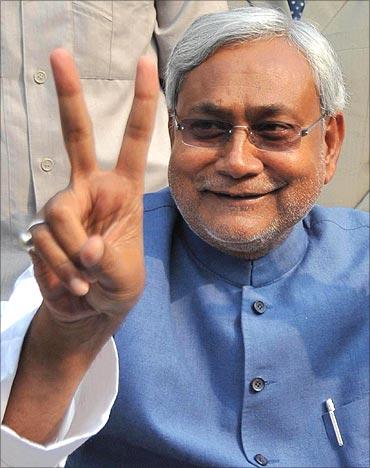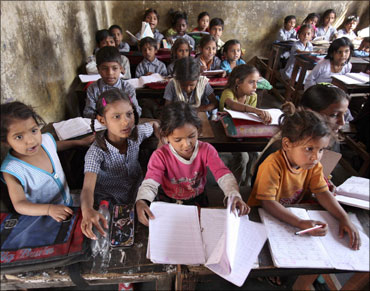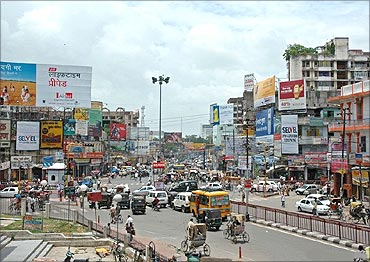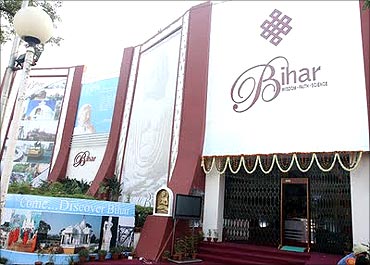 | « Back to article | Print this article |
Bihar: From Bimaru to booming?
A recent visit to Patna reinforced this impression: it is the most happening city in India. True, it is still dirty and unplanned. Traffic pretty much does as it likes. There is no sense of civic responsibility or ownership.
All this is exasperating because Patna is where you can reach out and touch change. A Miss Bihar contest is to be held in early 2012, revived since 2008.
Before that, the last one was held in the 1970s. There were one or two in between but they lost credibility when the Miss Bihar title-holder turned out to be from Allahabad, and (oh no!) married!
In 2008, the contest sank without a trace after some contestants alleged that the competition was rigged, stormed the stage, seized the microphone and started shouting slogans, alleging that the organisers had taken bribes to manipulate results.
Now the city is organising a marathon on February 19, 2012. The organisers are a set of non-resident Biharis, one of whom has taken a three-month sabbatical from investment banking and is camping in Patna to make the arrangement.
Click NEXT to read on . . .
Bihar: From Bimaru to booming?
"The marathon would unleash a human energy that will send potent vibrations to the entire world about the arrival of Bihar and Biharis on unlimited growth path (sic). It will invite all to become stakeholders in the making of history in Bihar," he says.
The idea came to them, he says, because all great cities in the world have a marathon. So why not Patna?
Why not indeed?
It is not just Patna that appears to be prospering. Earlier this month, a young farmer in Nalanda, Sumant (no last name), set a new world record in paddy production.
Sumant managed to grow 224 quintals of paddy per hectare beating the world record held by Chinese farm scientist Yuan Longping.
He and four of his farmer friends used the System of Rice Intensification, a new technique that uses less water and seed than traditional methods but provides greater yields. All of them got fantastic yields.
Click NEXT to read on . . .
Bihar: From Bimaru to booming?
But there are others who say all this doesn't mean much. Bihar continues to have the lowest per capita power consumption in the country.
It has an installed capacity of 600 Mw but the functional capacity is just 200 Mw. The Barh superthermal power station is coming up on Bihar land, but the state will get only 10 per cent of the power generated.
Shortage of not just power but land is turning initially enthusiastic industry away from investment. Two major cycle plants were to come up in Bihar. They've shelved their plans.
A cement company had announced it was setting up shop. It has gone back. An asbestos company looking to set up a plant found it could get no land. A major distillery and brewery acquisition brought foreign direct investment to Bihar earlier this year. But not much has been heard of it since.
There appears to be a revival of other disturbing trends. Kidnapping for ransom, everyone thought, had gone away. It has returned. Children are being kidnapped and one of them was killed when, putting their faith in the police, the parents refused to pay a ransom.
Click NEXT to read on . . .
Bihar: From Bimaru to booming?
Two traders have been looted in the last two weeks in the heart of Patna: the sum involved was Rs 18 lakh (Rs 1.8 million) and Rs 45 lakh (Rs 4.5 million) each.
All this indicates organised crime and a contempt of law enforcement. Bihar's road construction contracts were one way of getting criminal gangs, who enjoyed the patronage and protection of political personalities, off the roads. But now they're back.
Corruption at lower levels -- the so-called C and D class employees -- is rampant. A colleague recently lost a mobile phone. A policeman demanded Rs 200 to register a complaint. His argument: "you've lost a phone that cost Rs 10,000 -- and you can't pay Rs 200 to file a complaint?"
The biggest crisis Bihar is going to see is in agriculture. The last monsoon was good and it has been a bumper harvest of paddy.
However, the state government's procurement system is leaky and inefficient. The state has no milling capacity worth the name.
Click NEXT to read on . . .
Bihar: From Bimaru to booming?
Planning Commission Advisor N C Saxena has charged that the Nitish Kumar government had failed to utilise a major chunk of funds provided for the centrally sponsored schemes, depriving the state of subsidy to the tune of Rs 10,000 crore (Rs 100 billion) to Rs 12,000 crore (Rs 120 billion).
"The reason is that there is no proper administrative system in Bihar that can maintain control over expenditure and transparency in implementation of these schemes," he alleged.
For example, Saxena said, under the National Rural Health Mission Bihar's share stood at Rs 1,300 crore (Rs 13 billion) but the state received Rs 780 crore (Rs 7.80 billion), while states like Tamil Nadu and West Bengal fully utilised the subsidy for Mid-Day Meals.
Ok, Bihar isn't going to become a Tamil Nadu overnight. But the state has to be given full marks for trying.
And as much as Chief Minister Nitish Kumar and his team, it is the Biharis who deserve support. All of India will be yelling "Go, Bihar, Go" in February.





